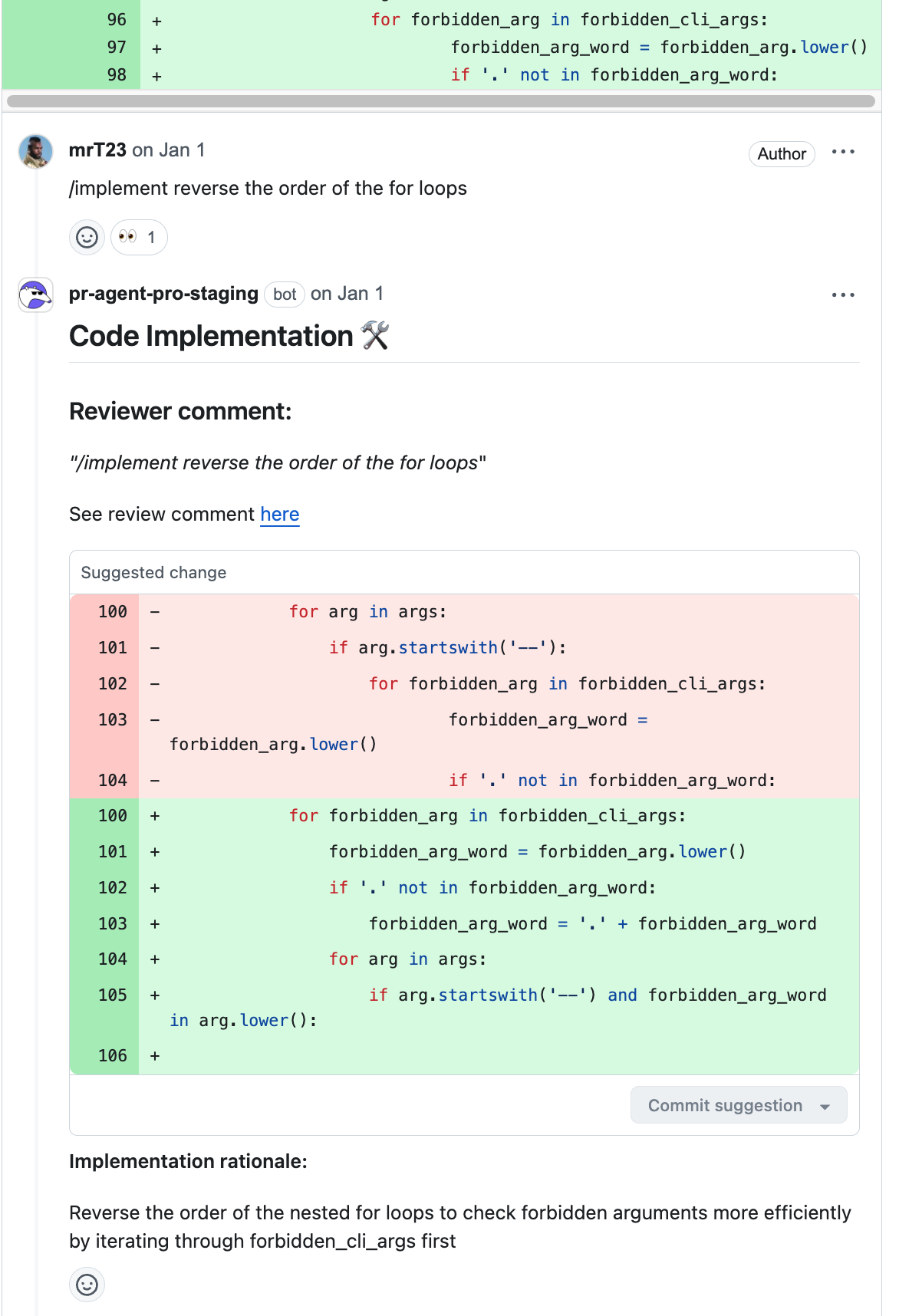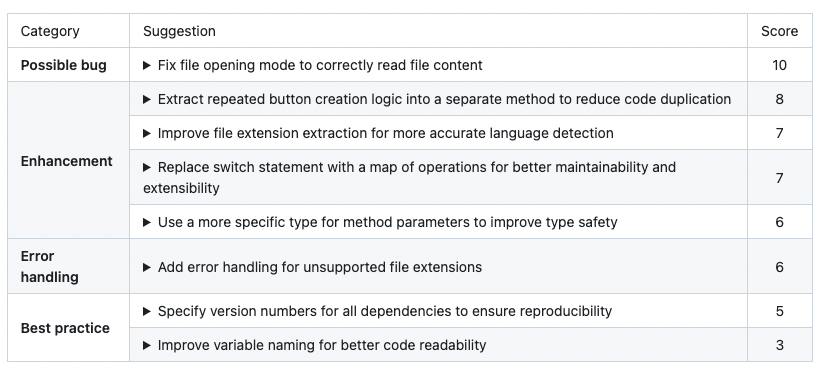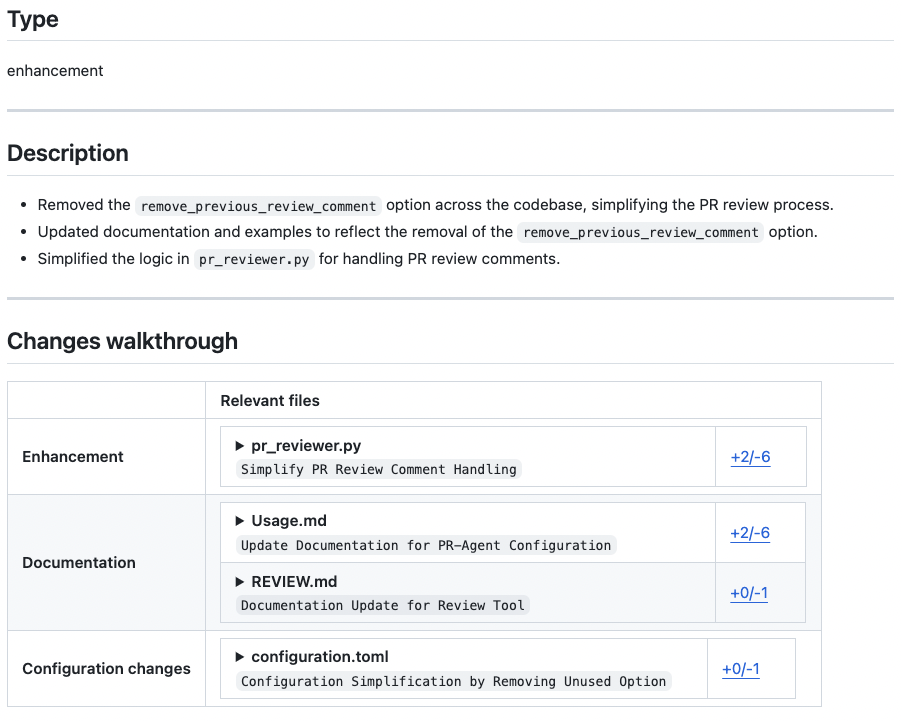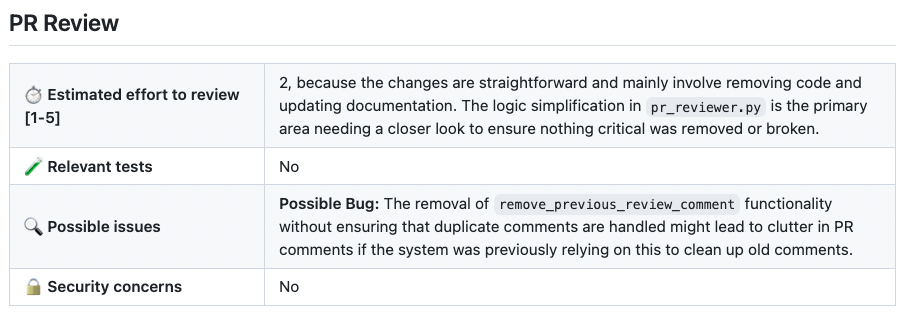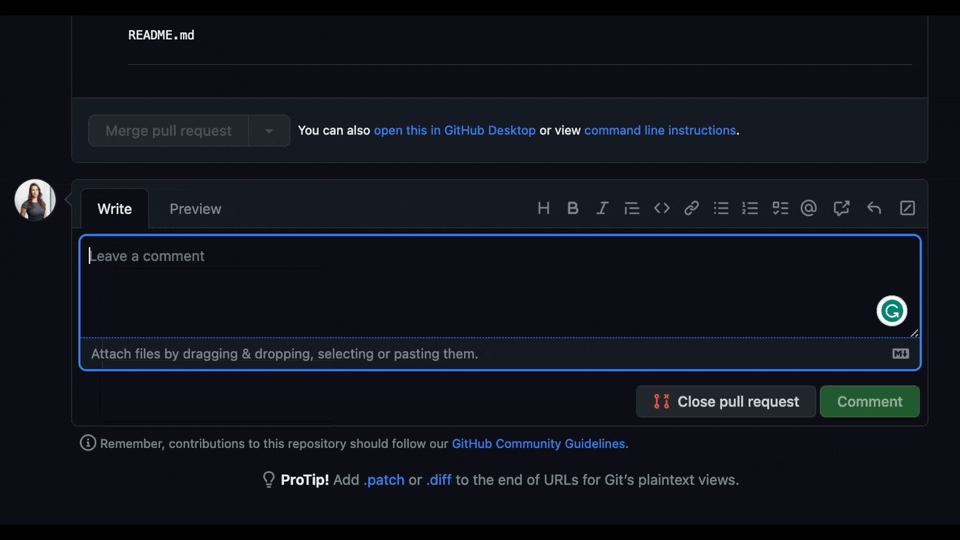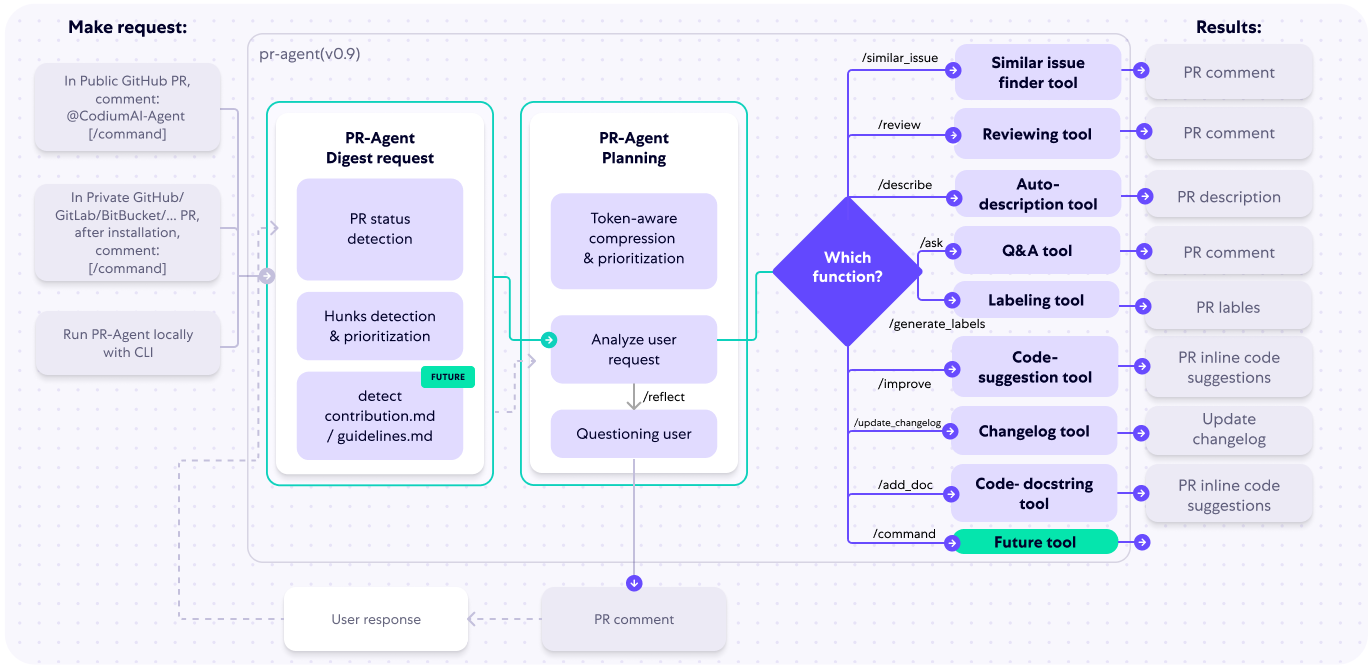
pr-agent
🚀 PR-Agent (Qodo Merge open-source): An AI-Powered 🤖 Tool for Automated Pull Request Analysis, Feedback, Suggestions and More! 💻🔍
Stars: 6536
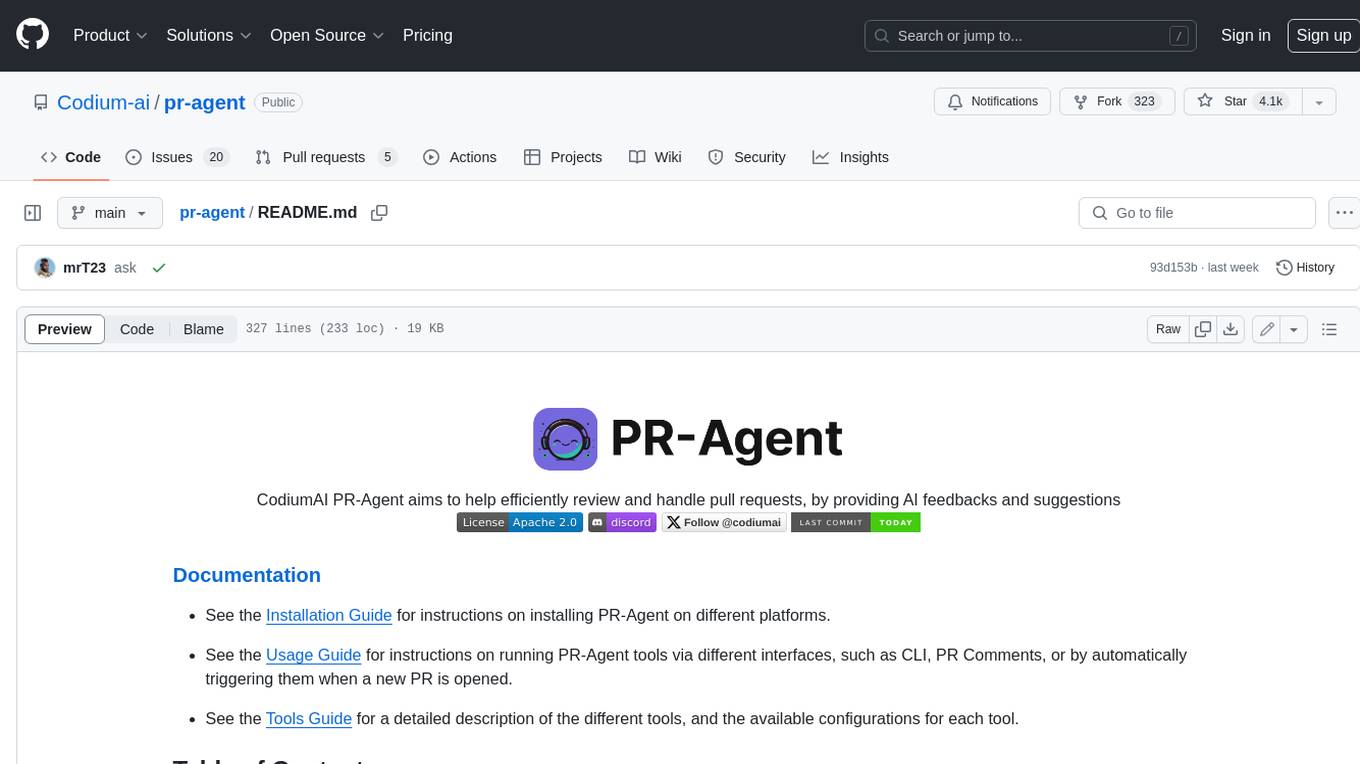
PR-Agent is a tool that helps to efficiently review and handle pull requests by providing AI feedbacks and suggestions. It supports various commands such as generating PR descriptions, providing code suggestions, answering questions about the PR, and updating the CHANGELOG.md file. PR-Agent can be used via CLI, GitHub Action, GitHub App, Docker, and supports multiple git providers and models. It emphasizes real-life practical usage, with each tool having a single GPT-4 call for quick and affordable responses. The PR Compression strategy enables effective handling of both short and long PRs, while the JSON prompting strategy allows for modular and customizable tools. PR-Agent Pro, the hosted version by CodiumAI, provides additional benefits such as full management, improved privacy, priority support, and extra features.
README:
-
See the Installation Guide for instructions on installing PR-Agent on different platforms.
-
See the Usage Guide for instructions on running PR-Agent tools via different interfaces, such as CLI, PR Comments, or by automatically triggering them when a new PR is opened.
-
See the Tools Guide for a detailed description of the different tools, and the available configurations for each tool.
New tool /Implement (💎), which converts human code review discussions and feedback into ready-to-commit code changes.
Update logic and documentation for running local models via Ollama.
Following feedback from the community, we have addressed two vulnerabilities identified in the open-source PR-Agent project. The fixes are now included in the newly released version (v0.26), available as of today.
The review tool previously included a legacy feature for providing code suggestions (controlled by '--pr_reviewer.num_code_suggestion'). This functionality has been deprecated. Use instead the improve tool, which offers higher quality and more actionable code suggestions.
Open-source repositories can now freely use Qodo Merge, and enjoy easy one-click installation using a marketplace app.
See here for more details about installing Qodo Merge for private repositories.
A new mode was enabled by default for code suggestions - --pr_code_suggestions.focus_only_on_problems=true:
- This option reduces the number of code suggestions received
- The suggestions will focus more on identifying and fixing code problems, rather than style considerations like best practices, maintainability, or readability.
- The suggestions will be categorized into just two groups: "Possible Issues" and "General".
Still, if you prefer the previous mode, you can set --pr_code_suggestions.focus_only_on_problems=false in the configuration file.
Example results:
Original mode
Focused mode
Supported commands per platform:
| GitHub | GitLab | Bitbucket | Azure DevOps | ||
|---|---|---|---|---|---|
| TOOLS | Review | ✅ | ✅ | ✅ | ✅ |
| Describe | ✅ | ✅ | ✅ | ✅ | |
| Improve | ✅ | ✅ | ✅ | ✅ | |
| Ask | ✅ | ✅ | ✅ | ✅ | |
| ⮑ Ask on code lines | ✅ | ✅ | |||
| Update CHANGELOG | ✅ | ✅ | ✅ | ✅ | |
| Ticket Context 💎 | ✅ | ✅ | ✅ | ||
| Utilizing Best Practices 💎 | ✅ | ✅ | ✅ | ||
| PR Chat 💎 | ✅ | ||||
| Suggestion Tracking 💎 | ✅ | ✅ | |||
| CI Feedback 💎 | ✅ | ||||
| PR Documentation 💎 | ✅ | ✅ | |||
| Custom Labels 💎 | ✅ | ✅ | |||
| Analyze 💎 | ✅ | ✅ | |||
| Similar Code 💎 | ✅ | ||||
| Custom Prompt 💎 | ✅ | ✅ | ✅ | ||
| Test 💎 | ✅ | ✅ | |||
| Implement 💎 | ✅ | ✅ | ✅ | ||
| USAGE | CLI | ✅ | ✅ | ✅ | ✅ |
| App / webhook | ✅ | ✅ | ✅ | ✅ | |
| Tagging bot | ✅ | ||||
| Actions | ✅ | ✅ | ✅ | ✅ | |
| CORE | PR compression | ✅ | ✅ | ✅ | ✅ |
| Adaptive and token-aware file patch fitting | ✅ | ✅ | ✅ | ✅ | |
| Multiple models support | ✅ | ✅ | ✅ | ✅ | |
| Local and global metadata | ✅ | ✅ | ✅ | ✅ | |
| Dynamic context | ✅ | ✅ | ✅ | ✅ | |
| Self reflection | ✅ | ✅ | ✅ | ✅ | |
| Static code analysis 💎 | ✅ | ✅ | ✅ | ||
| Global and wiki configurations 💎 | ✅ | ✅ | ✅ | ||
| PR interactive actions 💎 | ✅ | ✅ | |||
| Impact Evaluation 💎 | ✅ | ✅ |
- 💎 means this feature is available only in Qodo-Merge
‣ Auto Description (/describe): Automatically generating PR description - title, type, summary, code walkthrough and labels.
‣ Auto Review (/review): Adjustable feedback about the PR, possible issues, security concerns, review effort and more.
‣ Code Suggestions (/improve): Code suggestions for improving the PR.
‣ Question Answering (/ask ...): Answering free-text questions about the PR.
‣ Update Changelog (/update_changelog): Automatically updating the CHANGELOG.md file with the PR changes.
‣ Find Similar Issue (/similar_issue): Automatically retrieves and presents similar issues.
‣ Add Documentation 💎 (/add_docs): Generates documentation to methods/functions/classes that changed in the PR.
‣ Generate Custom Labels 💎 (/generate_labels): Generates custom labels for the PR, based on specific guidelines defined by the user.
‣ Analyze 💎 (/analyze): Identify code components that changed in the PR, and enables to interactively generate tests, docs, and code suggestions for each component.
‣ Test 💎 (/test): Generate tests for a selected component, based on the PR code changes.
‣ Custom Prompt 💎 (/custom_prompt): Automatically generates custom suggestions for improving the PR code, based on specific guidelines defined by the user.
‣ Generate Tests 💎 (/test component_name): Generates unit tests for a selected component, based on the PR code changes.
‣ CI Feedback 💎 (/checks ci_job): Automatically generates feedback and analysis for a failed CI job.
‣ Similar Code 💎 (/find_similar_component): Retrieves the most similar code components from inside the organization's codebase, or from open-source code.
‣ Implement 💎 (/implement): Generates implementation code from review suggestions.
Try the GPT-4 powered PR-Agent instantly on your public GitHub repository. Just mention @CodiumAI-Agent and add the desired command in any PR comment. The agent will generate a response based on your command.
For example, add a comment to any pull request with the following text:
@CodiumAI-Agent /review
and the agent will respond with a review of your PR.
Note that this is a promotional bot, suitable only for initial experimentation.
It does not have 'edit' access to your repo, for example, so it cannot update the PR description or add labels (@CodiumAI-Agent /describe will publish PR description as a comment). In addition, the bot cannot be used on private repositories, as it does not have access to the files there.
To set up your own PR-Agent, see the Installation section below.
Note that when you set your own PR-Agent or use Qodo hosted PR-Agent, there is no need to mention @CodiumAI-Agent .... Instead, directly start with the command, e.g., /ask ....
Qodo Merge is a hosted version of PR-Agent, provided by Qodo. It is available for a monthly fee, and provides the following benefits:
- Fully managed - We take care of everything for you - hosting, models, regular updates, and more. Installation is as simple as signing up and adding the Qodo Merge app to your GitHub\GitLab\BitBucket repo.
- Improved privacy - No data will be stored or used to train models. Qodo Merge will employ zero data retention, and will use an OpenAI account with zero data retention.
- Improved support - Qodo Merge users will receive priority support, and will be able to request new features and capabilities.
- Extra features -In addition to the benefits listed above, Qodo Merge will emphasize more customization, and the usage of static code analysis, in addition to LLM logic, to improve results. See here for a list of features available in Qodo Merge.
The following diagram illustrates PR-Agent tools and their flow:
Check out the PR Compression strategy page for more details on how we convert a code diff to a manageable LLM prompt
A reasonable question that can be asked is: "Why use PR-Agent? What makes it stand out from existing tools?"
Here are some advantages of PR-Agent:
- We emphasize real-life practical usage. Each tool (review, improve, ask, ...) has a single GPT-4 call, no more. We feel that this is critical for realistic team usage - obtaining an answer quickly (~30 seconds) and affordably.
- Our PR Compression strategy is a core ability that enables to effectively tackle both short and long PRs.
- Our JSON prompting strategy enables to have modular, customizable tools. For example, the '/review' tool categories can be controlled via the configuration file. Adding additional categories is easy and accessible.
- We support multiple git providers (GitHub, Gitlab, Bitbucket), multiple ways to use the tool (CLI, GitHub Action, GitHub App, Docker, ...), and multiple models (GPT-4, GPT-3.5, Anthropic, Cohere, Llama2).
- If you host PR-Agent with your OpenAI API key, it is between you and OpenAI. You can read their API data privacy policy here: https://openai.com/enterprise-privacy
-
When using Qodo Merge 💎, hosted by Qodo, we will not store any of your data, nor will we use it for training. You will also benefit from an OpenAI account with zero data retention.
-
For certain clients, Qodo-hosted Qodo Merge will use Qodo’s proprietary models — if this is the case, you will be notified.
-
No passive collection of Code and Pull Requests’ data — Qodo Merge will be active only when you invoke it, and it will then extract and analyze only data relevant to the executed command and queried pull request.
- The Qodo Merge Chrome extension serves solely to modify the visual appearance of a GitHub PR screen. It does not transmit any user's repo or pull request code. Code is only sent for processing when a user submits a GitHub comment that activates a PR-Agent tool, in accordance with the standard privacy policy of Qodo-Merge.
- Discord community: https://discord.gg/kG35uSHDBc
- Qodo site: https://www.qodo.ai/
- Blog: https://www.qodo.ai/blog/
- Troubleshooting: https://www.qodo.ai/blog/technical-faq-and-troubleshooting/
- Support: [email protected]
For Tasks:
Click tags to check more tools for each tasksFor Jobs:
Alternative AI tools for pr-agent
Similar Open Source Tools

pr-agent
PR-Agent is a tool that helps to efficiently review and handle pull requests by providing AI feedbacks and suggestions. It supports various commands such as generating PR descriptions, providing code suggestions, answering questions about the PR, and updating the CHANGELOG.md file. PR-Agent can be used via CLI, GitHub Action, GitHub App, Docker, and supports multiple git providers and models. It emphasizes real-life practical usage, with each tool having a single GPT-4 call for quick and affordable responses. The PR Compression strategy enables effective handling of both short and long PRs, while the JSON prompting strategy allows for modular and customizable tools. PR-Agent Pro, the hosted version by CodiumAI, provides additional benefits such as full management, improved privacy, priority support, and extra features.
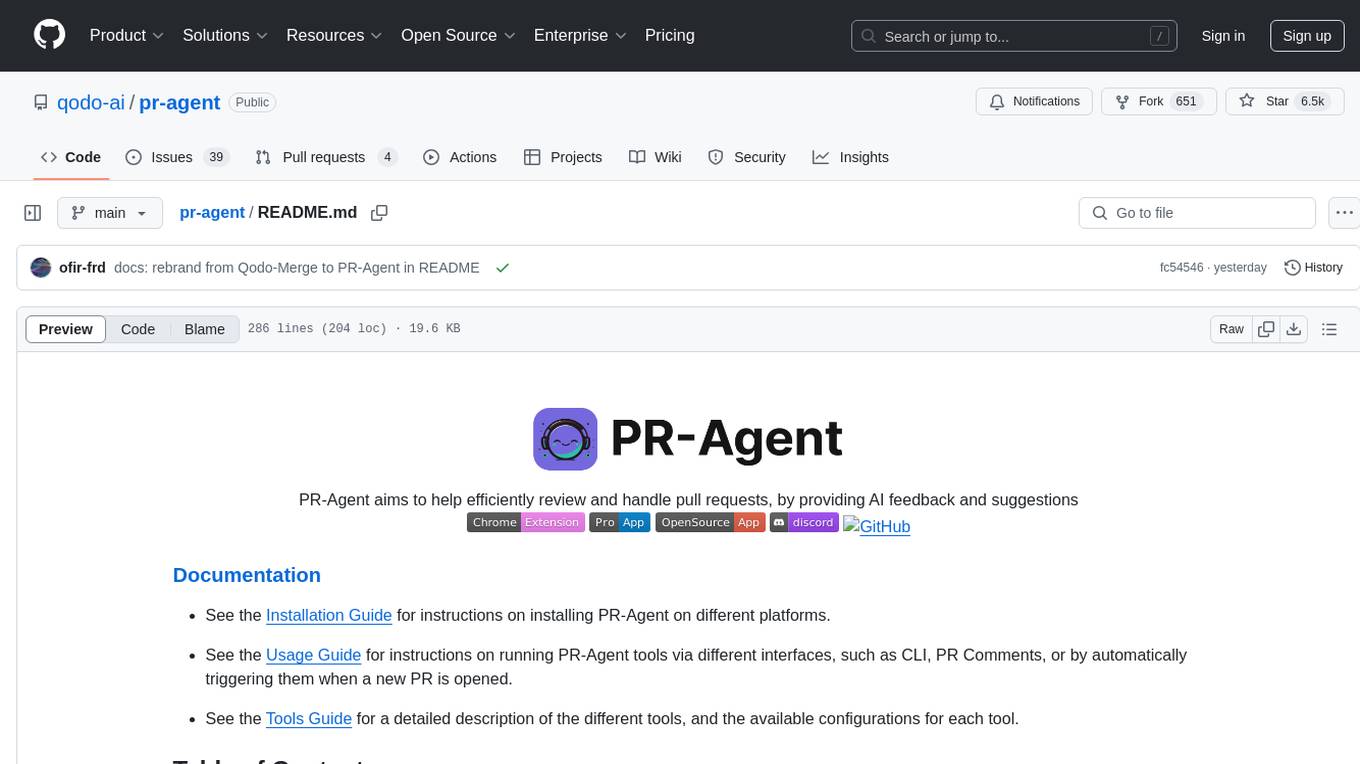
pr-agent
PR-Agent is a tool designed to assist in efficiently reviewing and handling pull requests by providing AI feedback and suggestions. It offers various tools such as Review, Describe, Improve, Ask, Update CHANGELOG, and more, with the ability to run them via different interfaces like CLI, PR Comments, or automatically triggering them when a new PR is opened. The tool supports multiple git platforms and models, emphasizing real-life practical usage and modular, customizable tools.
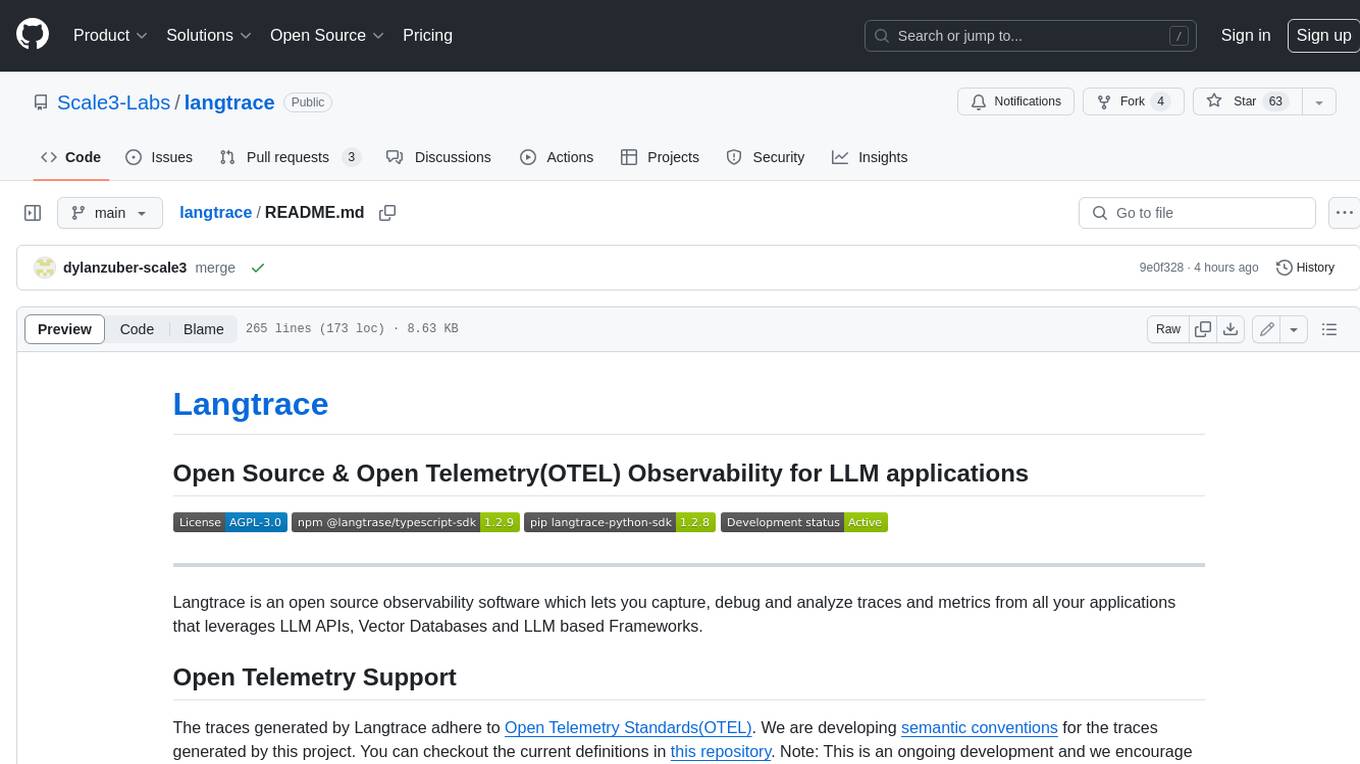
langtrace
Langtrace is an open source observability software that lets you capture, debug, and analyze traces and metrics from all your applications that leverage LLM APIs, Vector Databases, and LLM-based Frameworks. It supports Open Telemetry Standards (OTEL), and the traces generated adhere to these standards. Langtrace offers both a managed SaaS version (Langtrace Cloud) and a self-hosted option. The SDKs for both Typescript/Javascript and Python are available, making it easy to integrate Langtrace into your applications. Langtrace automatically captures traces from various vendors, including OpenAI, Anthropic, Azure OpenAI, Langchain, LlamaIndex, Pinecone, and ChromaDB.
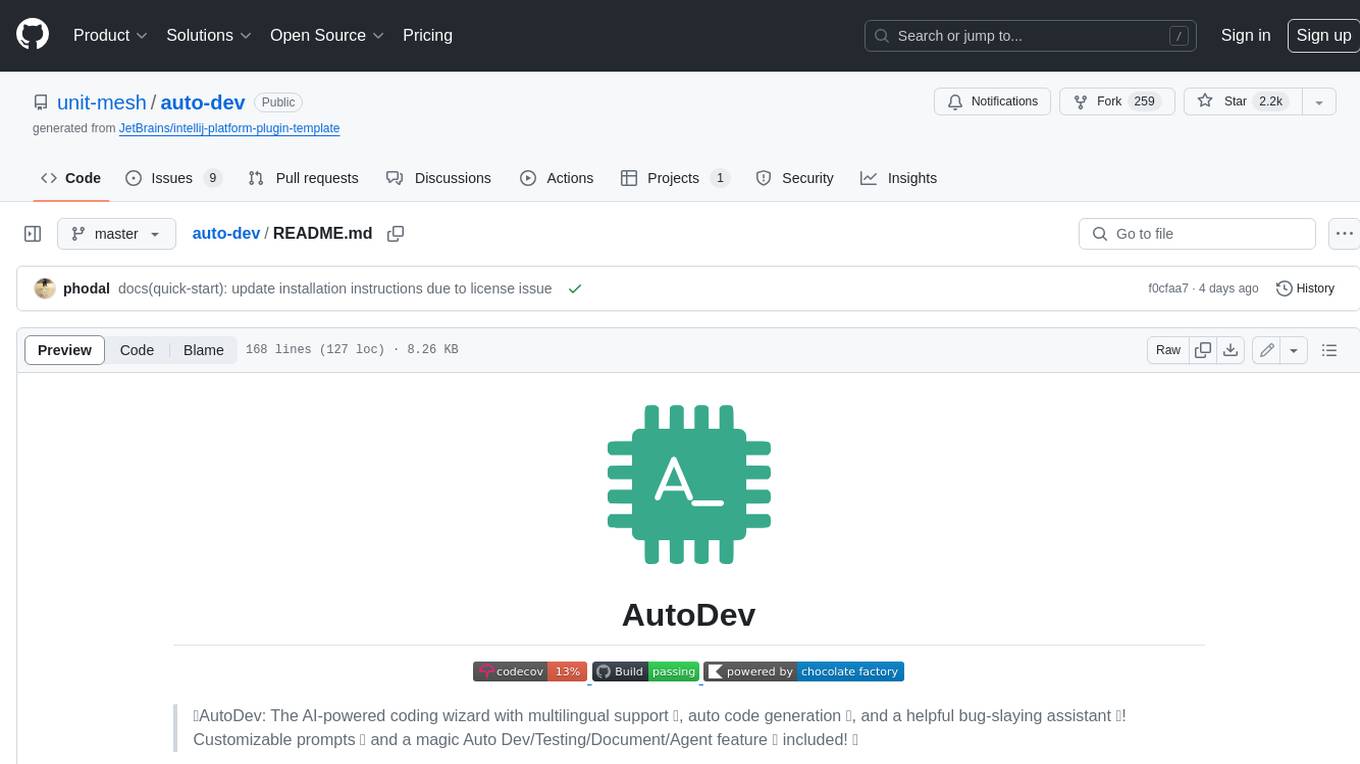
auto-dev
AutoDev is an AI-powered coding wizard that supports multiple languages, including Java, Kotlin, JavaScript/TypeScript, Rust, Python, Golang, C/C++/OC, and more. It offers a range of features, including auto development mode, copilot mode, chat with AI, customization options, SDLC support, custom AI agent integration, and language features such as language support, extensions, and a DevIns language for AI agent development. AutoDev is designed to assist developers with tasks such as auto code generation, bug detection, code explanation, exception tracing, commit message generation, code review content generation, smart refactoring, Dockerfile generation, CI/CD config file generation, and custom shell/command generation. It also provides a built-in LLM fine-tune model and supports UnitEval for LLM result evaluation and UnitGen for code-LLM fine-tune data generation.
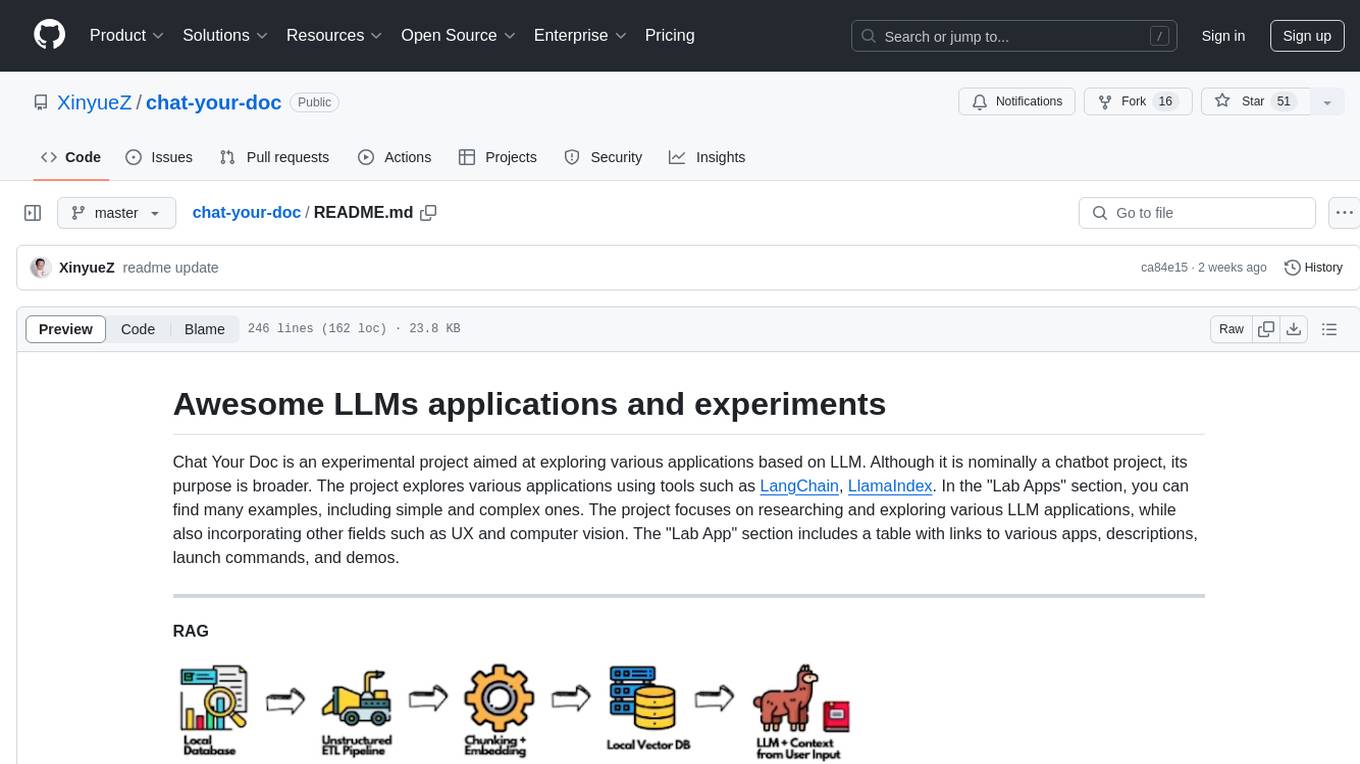
chat-your-doc
Chat Your Doc is an experimental project exploring various applications based on LLM technology. It goes beyond being just a chatbot project, focusing on researching LLM applications using tools like LangChain and LlamaIndex. The project delves into UX, computer vision, and offers a range of examples in the 'Lab Apps' section. It includes links to different apps, descriptions, launch commands, and demos, aiming to showcase the versatility and potential of LLM applications.
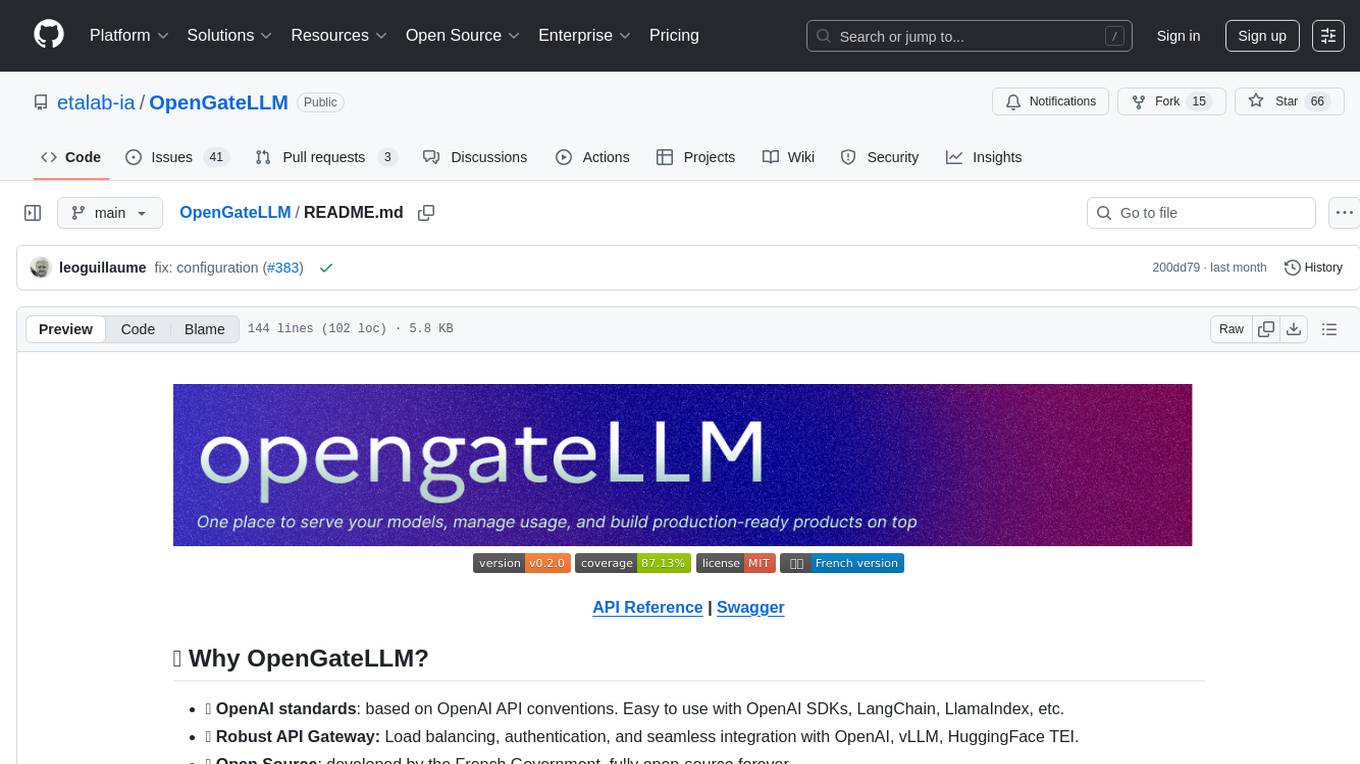
OpenGateLLM
OpenGateLLM is an open-source API gateway developed by the French Government, designed to serve AI models in production. It follows OpenAI standards and offers robust features like RAG integration, audio transcription, OCR, and more. With support for multiple AI backends and built-in security, OpenGateLLM provides a production-ready solution for various AI tasks.
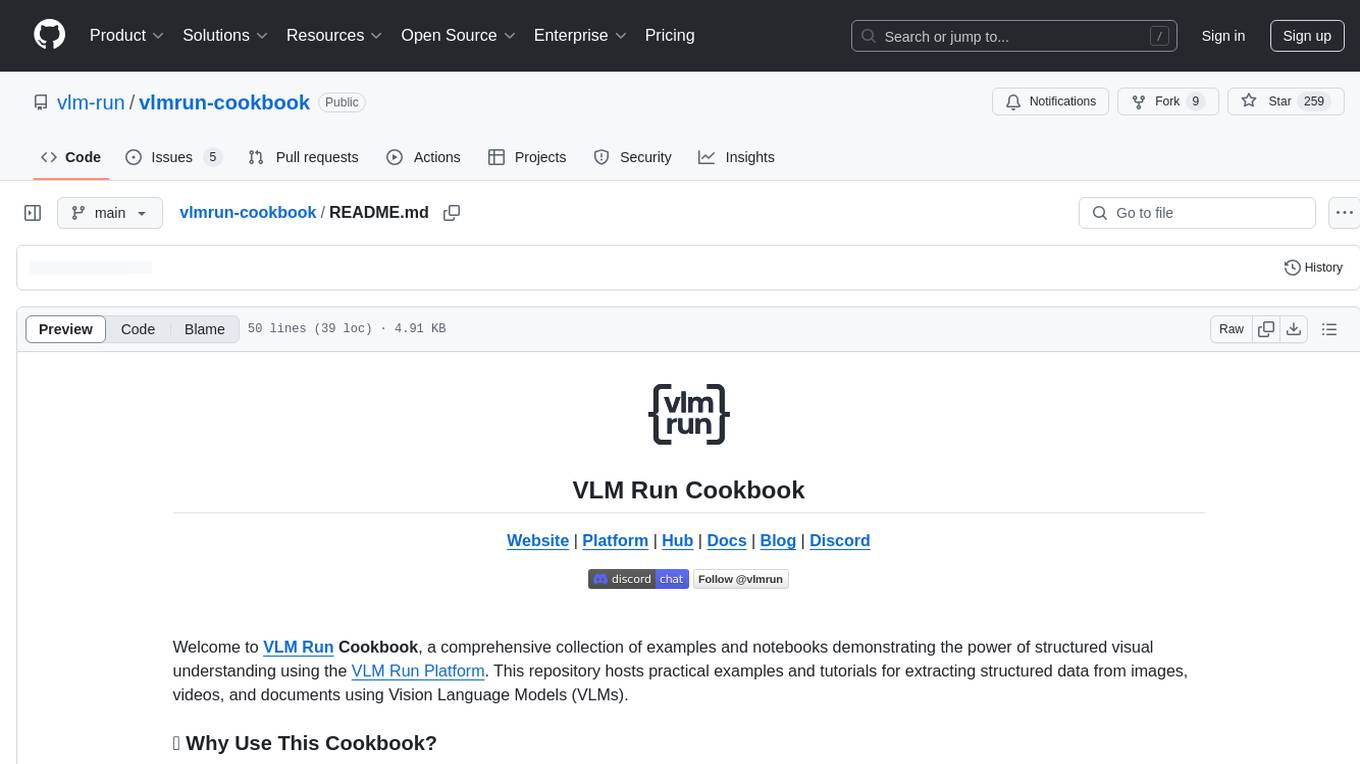
vlmrun-cookbook
VLM Run Cookbook is a repository containing practical examples and tutorials for extracting structured data from images, videos, and documents using Vision Language Models (VLMs). It offers comprehensive Colab notebooks demonstrating real-world applications of VLM Run, with complete code and documentation for easy adaptation. The examples cover various domains such as financial documents and TV news analysis.

langchain_dart
LangChain.dart is a Dart port of the popular LangChain Python framework created by Harrison Chase. LangChain provides a set of ready-to-use components for working with language models and a standard interface for chaining them together to formulate more advanced use cases (e.g. chatbots, Q&A with RAG, agents, summarization, extraction, etc.). The components can be grouped into a few core modules: * **Model I/O:** LangChain offers a unified API for interacting with various LLM providers (e.g. OpenAI, Google, Mistral, Ollama, etc.), allowing developers to switch between them with ease. Additionally, it provides tools for managing model inputs (prompt templates and example selectors) and parsing the resulting model outputs (output parsers). * **Retrieval:** assists in loading user data (via document loaders), transforming it (with text splitters), extracting its meaning (using embedding models), storing (in vector stores) and retrieving it (through retrievers) so that it can be used to ground the model's responses (i.e. Retrieval-Augmented Generation or RAG). * **Agents:** "bots" that leverage LLMs to make informed decisions about which available tools (such as web search, calculators, database lookup, etc.) to use to accomplish the designated task. The different components can be composed together using the LangChain Expression Language (LCEL).
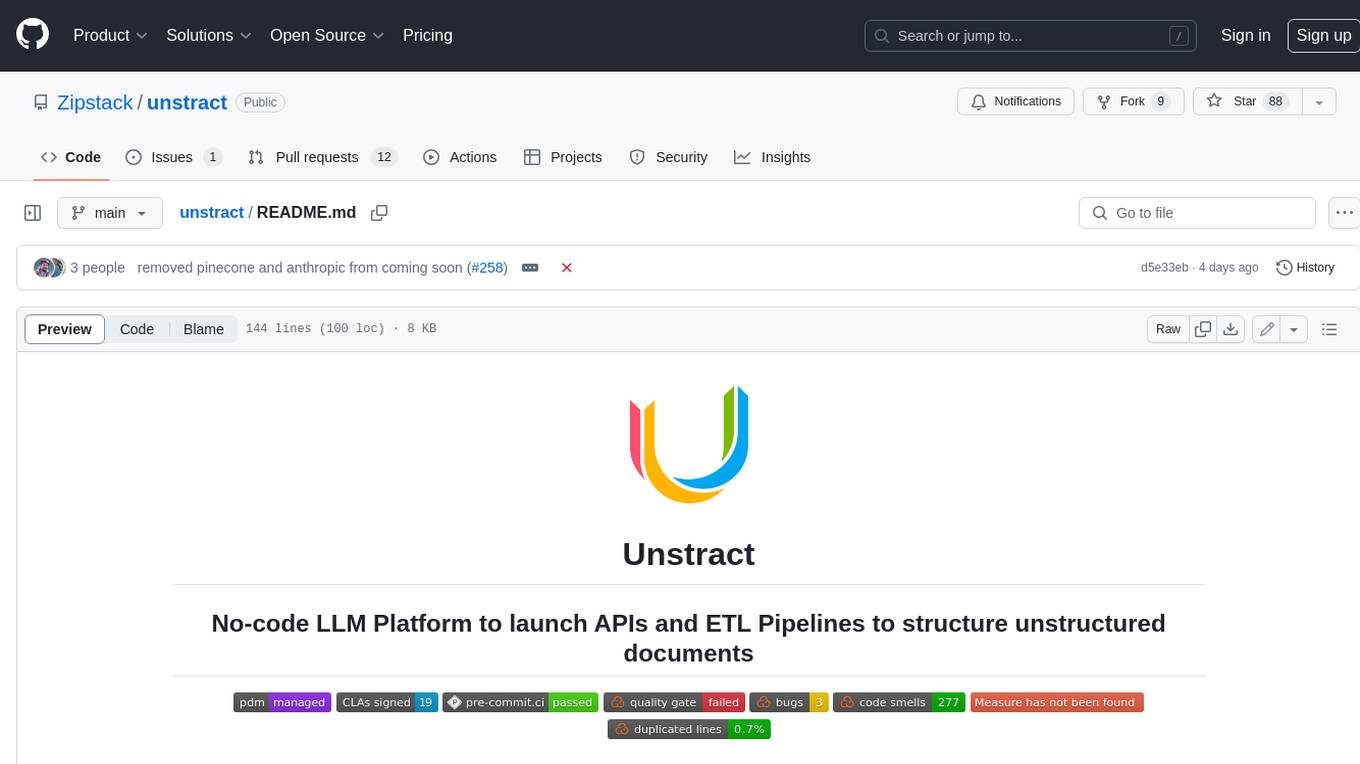
unstract
Unstract is a no-code platform that enables users to launch APIs and ETL pipelines to structure unstructured documents. With Unstract, users can go beyond co-pilots by enabling machine-to-machine automation. Unstract's Prompt Studio provides a simple, no-code approach to creating prompts for LLMs, vector databases, embedding models, and text extractors. Users can then configure Prompt Studio projects as API deployments or ETL pipelines to automate critical business processes that involve complex documents. Unstract supports a wide range of LLM providers, vector databases, embeddings, text extractors, ETL sources, and ETL destinations, providing users with the flexibility to choose the best tools for their needs.
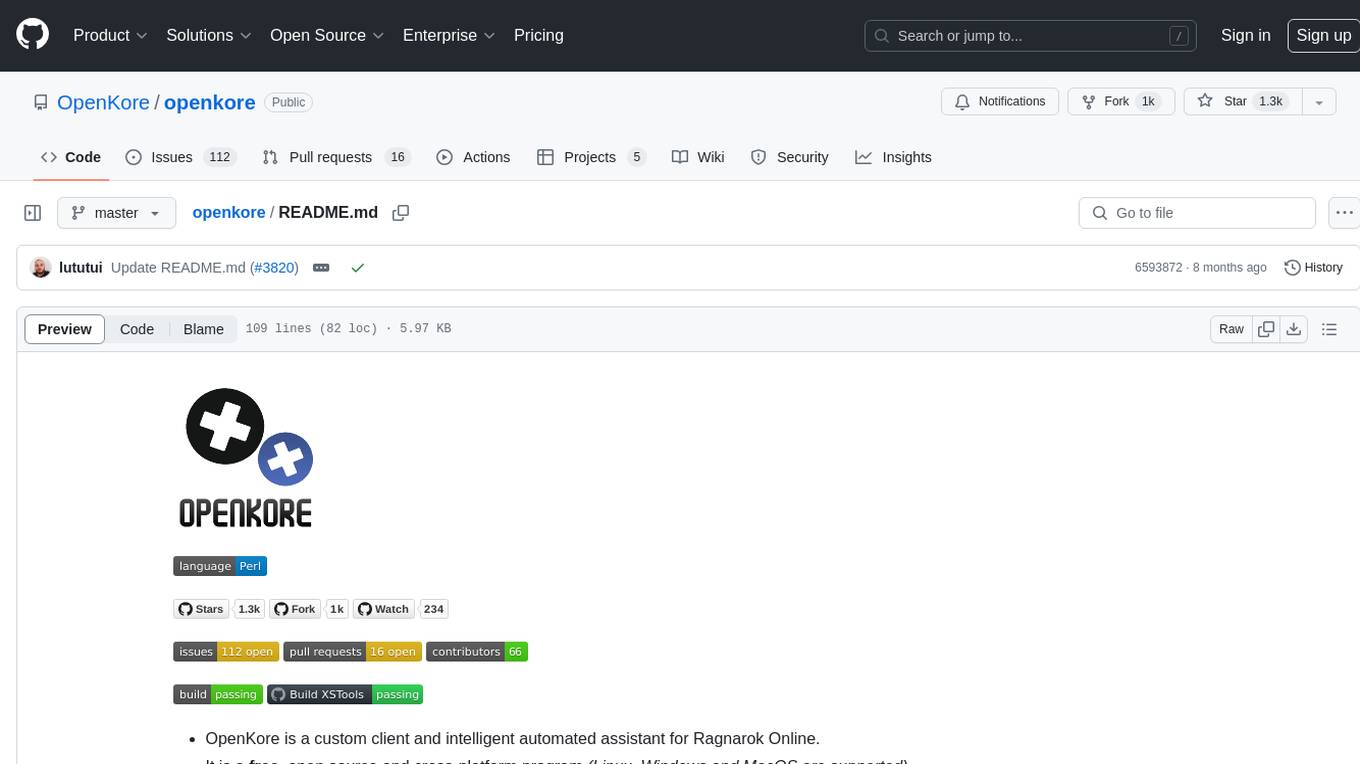
openkore
OpenKore is a custom client and intelligent automated assistant for Ragnarok Online. It is a free, open source, and cross-platform program (Linux, Windows, and MacOS are supported). To run OpenKore, you need to download and extract it or clone the repository using Git. Configure OpenKore according to the documentation and run openkore.pl to start. The tool provides a FAQ section for troubleshooting, guidelines for reporting issues, and information about botting status on official servers. OpenKore is developed by a global team, and contributions are welcome through pull requests. Various community resources are available for support and communication. Users are advised to comply with the GNU General Public License when using and distributing the software.
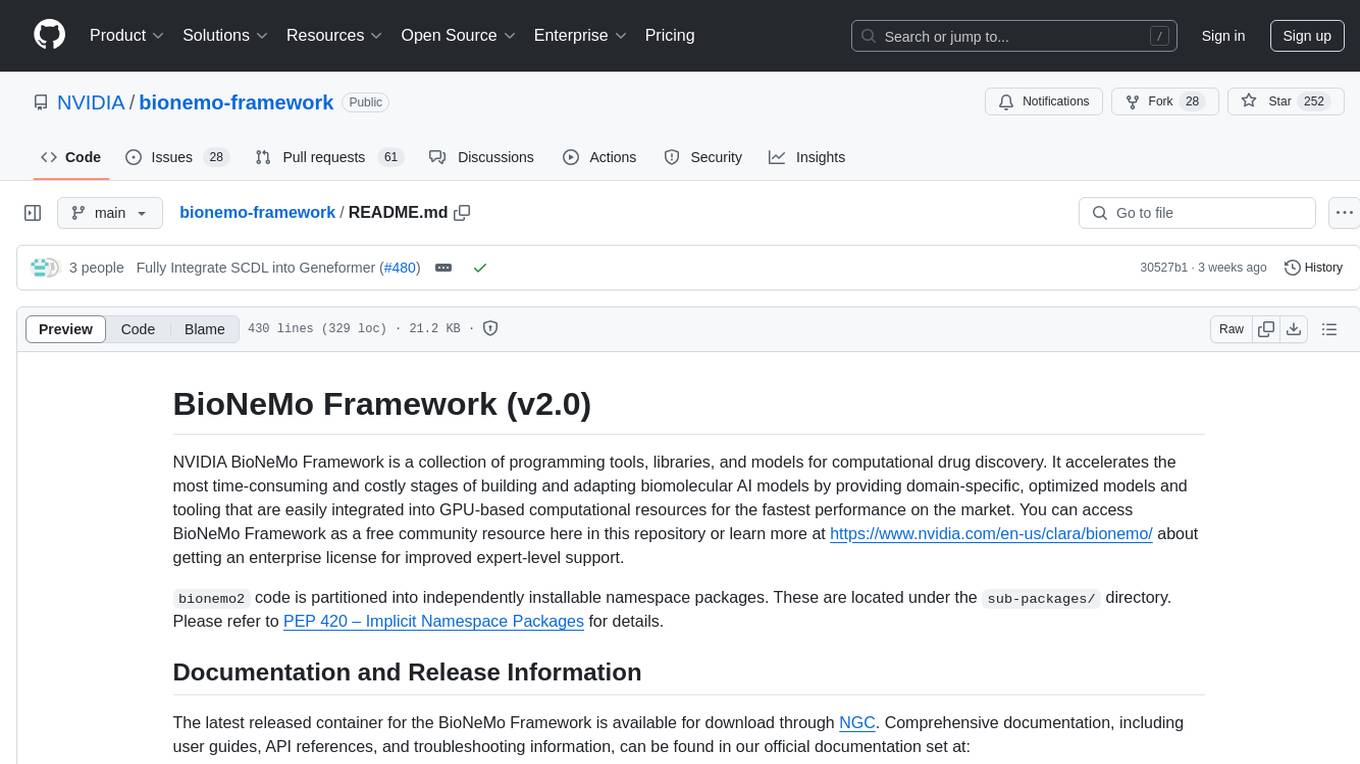
bionemo-framework
NVIDIA BioNeMo Framework is a collection of programming tools, libraries, and models for computational drug discovery. It accelerates building and adapting biomolecular AI models by providing domain-specific, optimized models and tooling for GPU-based computational resources. The framework offers comprehensive documentation and support for both community and enterprise users.
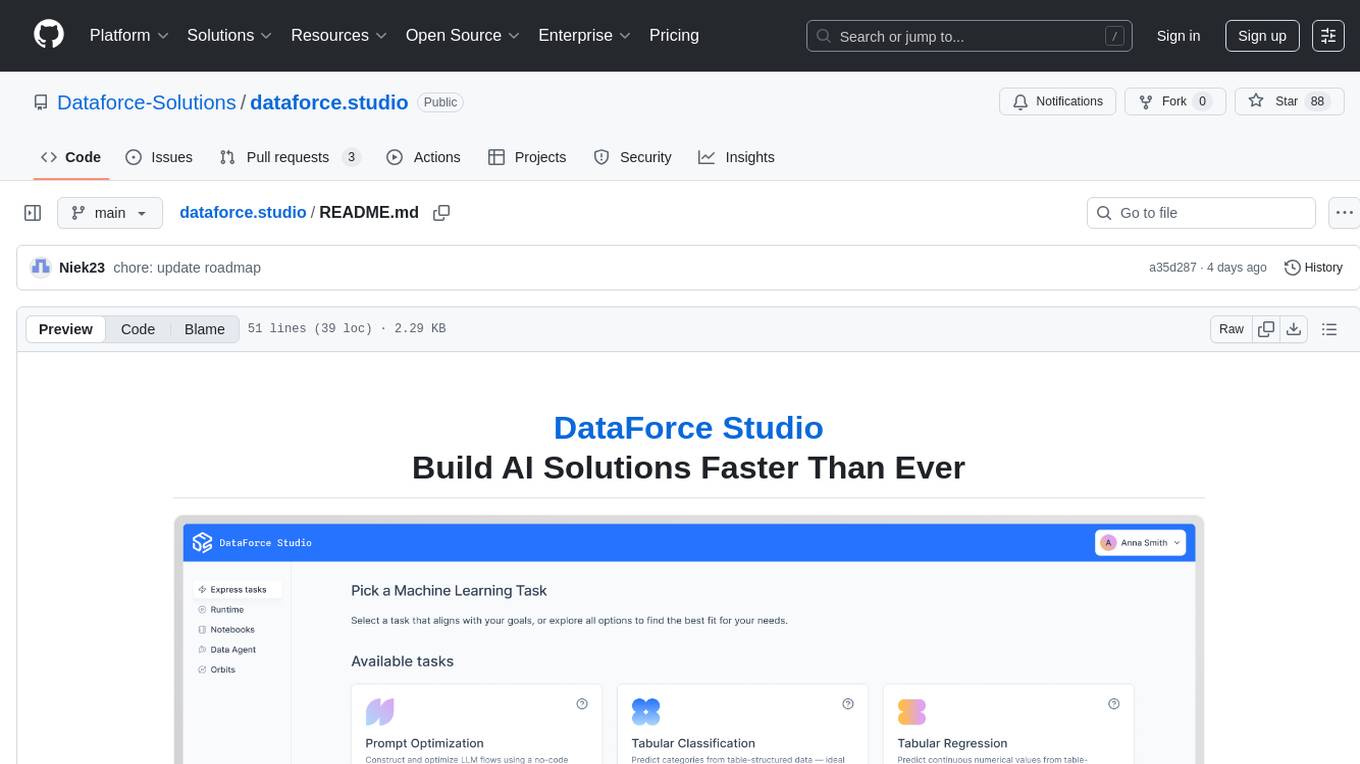
dataforce.studio
DataForce Studio is an open-source MLOps platform designed to help build, manage, and deploy AI/ML models with ease. It supports the entire model lifecycle, from creation to deployment and monitoring, within a user-friendly interface. The platform is in active early development, aiming to provide features like post-deployment monitoring, model deployment, data science agent, experiment snapshots, model cards, Python SDK, model registry, notebooks, in-browser runtime, and express tasks for prompt optimization and tabular data.
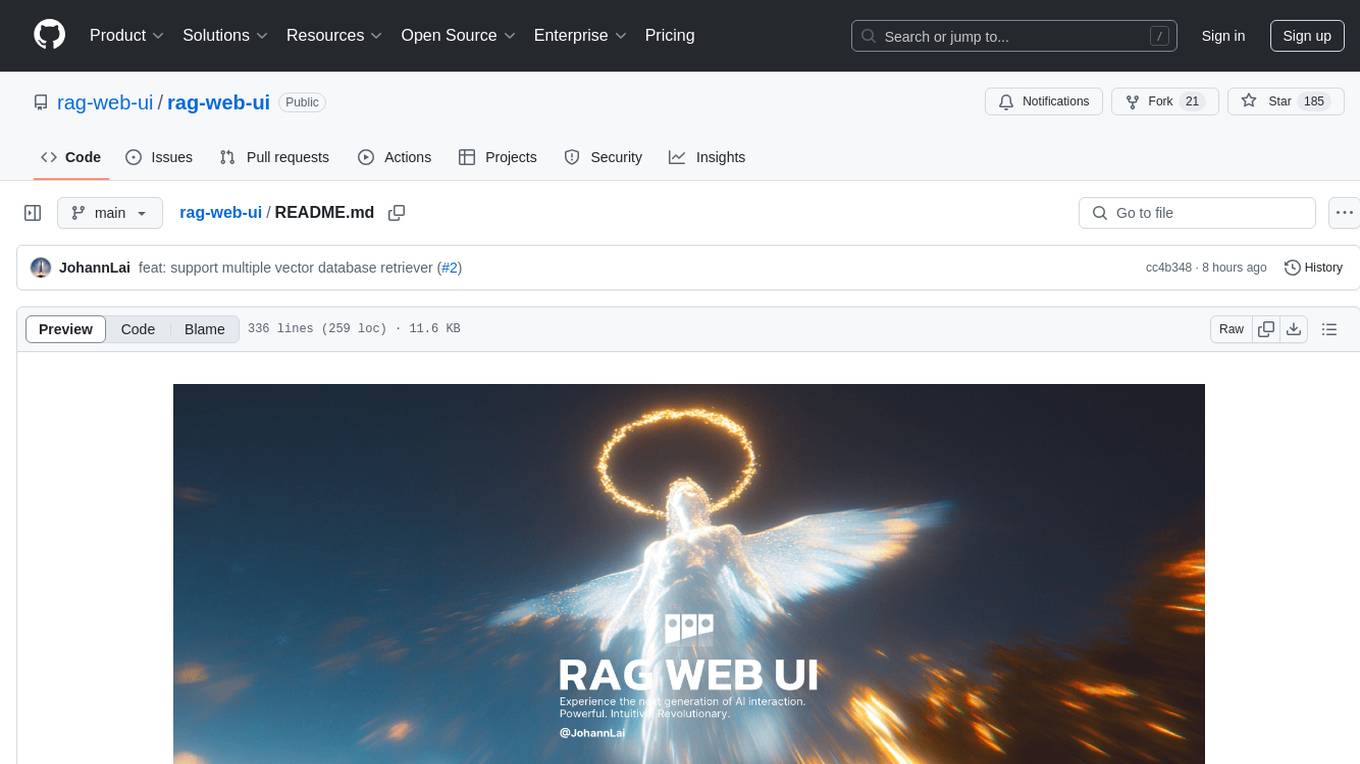
rag-web-ui
RAG Web UI is an intelligent dialogue system based on RAG (Retrieval-Augmented Generation) technology. It helps enterprises and individuals build intelligent Q&A systems based on their own knowledge bases. By combining document retrieval and large language models, it delivers accurate and reliable knowledge-based question-answering services. The system is designed with features like intelligent document management, advanced dialogue engine, and a robust architecture. It supports multiple document formats, async document processing, multi-turn contextual dialogue, and reference citations in conversations. The architecture includes a backend stack with Python FastAPI, MySQL + ChromaDB, MinIO, Langchain, JWT + OAuth2 for authentication, and a frontend stack with Next.js, TypeScript, Tailwind CSS, Shadcn/UI, and Vercel AI SDK for AI integration. Performance optimization includes incremental document processing, streaming responses, vector database performance tuning, and distributed task processing. The project is licensed under the Apache-2.0 License and is intended for learning and sharing RAG knowledge only, not for commercial purposes.
helicone
Helicone is an open-source observability platform designed for Language Learning Models (LLMs). It logs requests to OpenAI in a user-friendly UI, offers caching, rate limits, and retries, tracks costs and latencies, provides a playground for iterating on prompts and chat conversations, supports collaboration, and will soon have APIs for feedback and evaluation. The platform is deployed on Cloudflare and consists of services like Web (NextJs), Worker (Cloudflare Workers), Jawn (Express), Supabase, and ClickHouse. Users can interact with Helicone locally by setting up the required services and environment variables. The platform encourages contributions and provides resources for learning, documentation, and integrations.
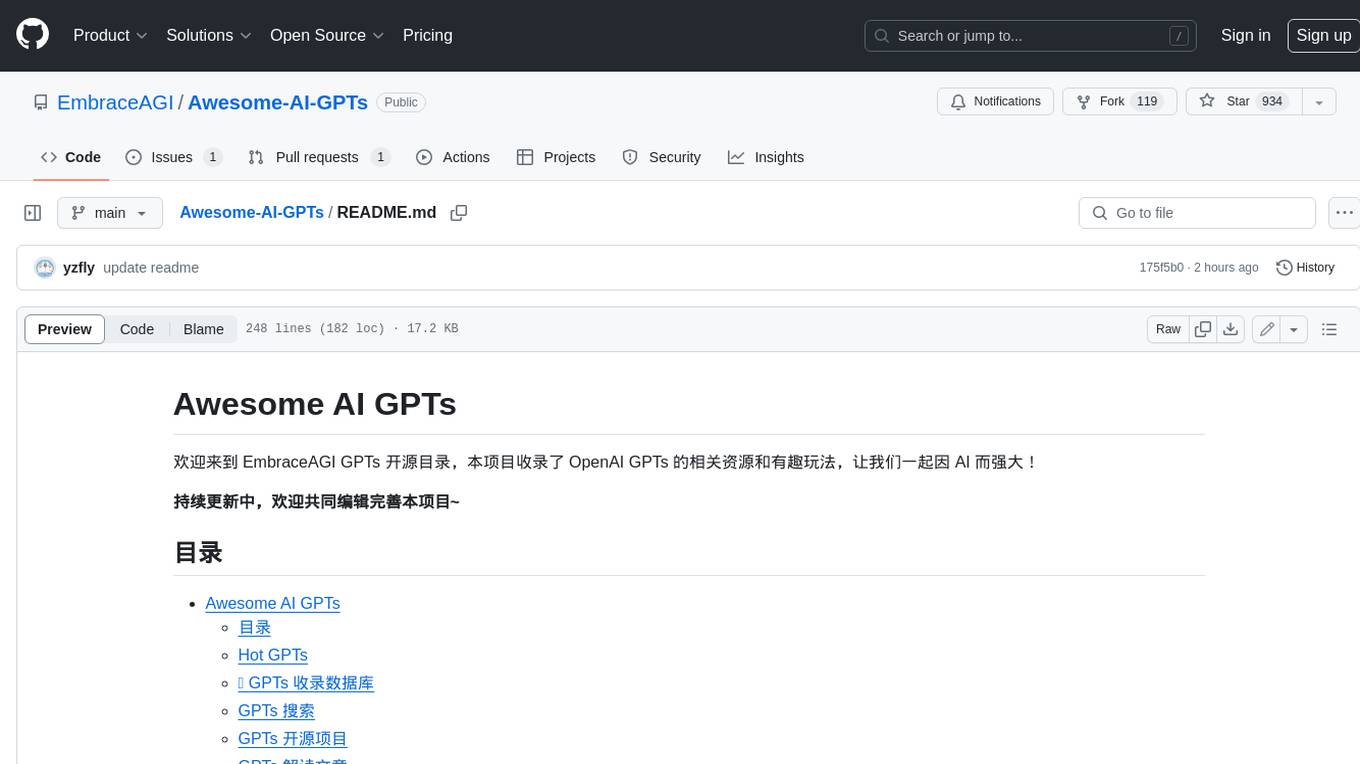
Awesome-AI-GPTs
Awesome AI GPTs is an open repository that collects resources and fun ways to use OpenAI GPTs. It includes databases, search tools, open-source projects, articles, attack and defense strategies, installation of custom plugins, knowledge bases, and community interactions related to GPTs. Users can find curated lists, leaked prompts, and various GPT applications in this repository. The project aims to empower users with AI capabilities and foster collaboration in the AI community.
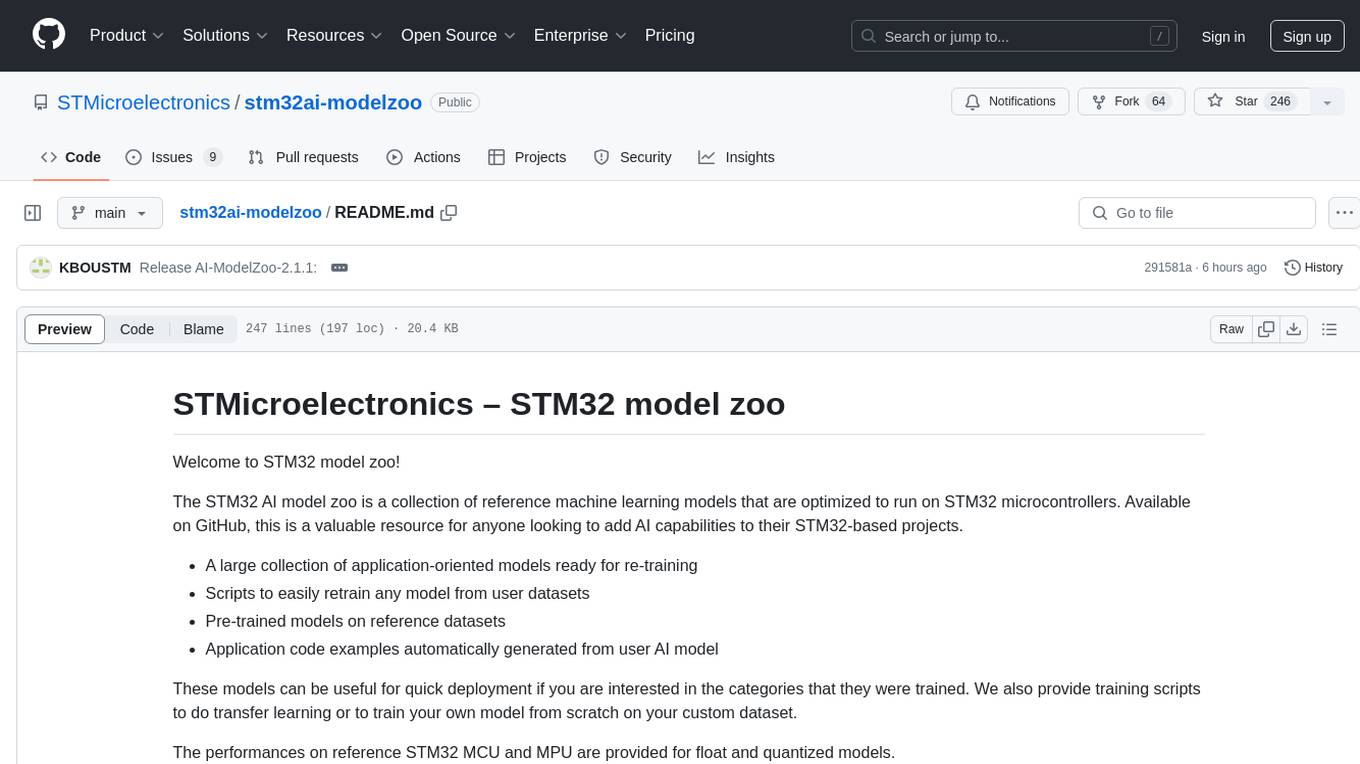
stm32ai-modelzoo
The STM32 AI model zoo is a collection of reference machine learning models optimized to run on STM32 microcontrollers. It provides a large collection of application-oriented models ready for re-training, scripts for easy retraining from user datasets, pre-trained models on reference datasets, and application code examples generated from user AI models. The project offers training scripts for transfer learning or training custom models from scratch. It includes performances on reference STM32 MCU and MPU for float and quantized models. The project is organized by application, providing step-by-step guides for training and deploying models.
For similar tasks

LLMStack
LLMStack is a no-code platform for building generative AI agents, workflows, and chatbots. It allows users to connect their own data, internal tools, and GPT-powered models without any coding experience. LLMStack can be deployed to the cloud or on-premise and can be accessed via HTTP API or triggered from Slack or Discord.

ai-guide
This guide is dedicated to Large Language Models (LLMs) that you can run on your home computer. It assumes your PC is a lower-end, non-gaming setup.

onnxruntime-genai
ONNX Runtime Generative AI is a library that provides the generative AI loop for ONNX models, including inference with ONNX Runtime, logits processing, search and sampling, and KV cache management. Users can call a high level `generate()` method, or run each iteration of the model in a loop. It supports greedy/beam search and TopP, TopK sampling to generate token sequences, has built in logits processing like repetition penalties, and allows for easy custom scoring.

jupyter-ai
Jupyter AI connects generative AI with Jupyter notebooks. It provides a user-friendly and powerful way to explore generative AI models in notebooks and improve your productivity in JupyterLab and the Jupyter Notebook. Specifically, Jupyter AI offers: * An `%%ai` magic that turns the Jupyter notebook into a reproducible generative AI playground. This works anywhere the IPython kernel runs (JupyterLab, Jupyter Notebook, Google Colab, Kaggle, VSCode, etc.). * A native chat UI in JupyterLab that enables you to work with generative AI as a conversational assistant. * Support for a wide range of generative model providers, including AI21, Anthropic, AWS, Cohere, Gemini, Hugging Face, NVIDIA, and OpenAI. * Local model support through GPT4All, enabling use of generative AI models on consumer grade machines with ease and privacy.

khoj
Khoj is an open-source, personal AI assistant that extends your capabilities by creating always-available AI agents. You can share your notes and documents to extend your digital brain, and your AI agents have access to the internet, allowing you to incorporate real-time information. Khoj is accessible on Desktop, Emacs, Obsidian, Web, and Whatsapp, and you can share PDF, markdown, org-mode, notion files, and GitHub repositories. You'll get fast, accurate semantic search on top of your docs, and your agents can create deeply personal images and understand your speech. Khoj is self-hostable and always will be.

langchain_dart
LangChain.dart is a Dart port of the popular LangChain Python framework created by Harrison Chase. LangChain provides a set of ready-to-use components for working with language models and a standard interface for chaining them together to formulate more advanced use cases (e.g. chatbots, Q&A with RAG, agents, summarization, extraction, etc.). The components can be grouped into a few core modules: * **Model I/O:** LangChain offers a unified API for interacting with various LLM providers (e.g. OpenAI, Google, Mistral, Ollama, etc.), allowing developers to switch between them with ease. Additionally, it provides tools for managing model inputs (prompt templates and example selectors) and parsing the resulting model outputs (output parsers). * **Retrieval:** assists in loading user data (via document loaders), transforming it (with text splitters), extracting its meaning (using embedding models), storing (in vector stores) and retrieving it (through retrievers) so that it can be used to ground the model's responses (i.e. Retrieval-Augmented Generation or RAG). * **Agents:** "bots" that leverage LLMs to make informed decisions about which available tools (such as web search, calculators, database lookup, etc.) to use to accomplish the designated task. The different components can be composed together using the LangChain Expression Language (LCEL).

danswer
Danswer is an open-source Gen-AI Chat and Unified Search tool that connects to your company's docs, apps, and people. It provides a Chat interface and plugs into any LLM of your choice. Danswer can be deployed anywhere and for any scale - on a laptop, on-premise, or to cloud. Since you own the deployment, your user data and chats are fully in your own control. Danswer is MIT licensed and designed to be modular and easily extensible. The system also comes fully ready for production usage with user authentication, role management (admin/basic users), chat persistence, and a UI for configuring Personas (AI Assistants) and their Prompts. Danswer also serves as a Unified Search across all common workplace tools such as Slack, Google Drive, Confluence, etc. By combining LLMs and team specific knowledge, Danswer becomes a subject matter expert for the team. Imagine ChatGPT if it had access to your team's unique knowledge! It enables questions such as "A customer wants feature X, is this already supported?" or "Where's the pull request for feature Y?"

infinity
Infinity is an AI-native database designed for LLM applications, providing incredibly fast full-text and vector search capabilities. It supports a wide range of data types, including vectors, full-text, and structured data, and offers a fused search feature that combines multiple embeddings and full text. Infinity is easy to use, with an intuitive Python API and a single-binary architecture that simplifies deployment. It achieves high performance, with 0.1 milliseconds query latency on million-scale vector datasets and up to 15K QPS.
For similar jobs
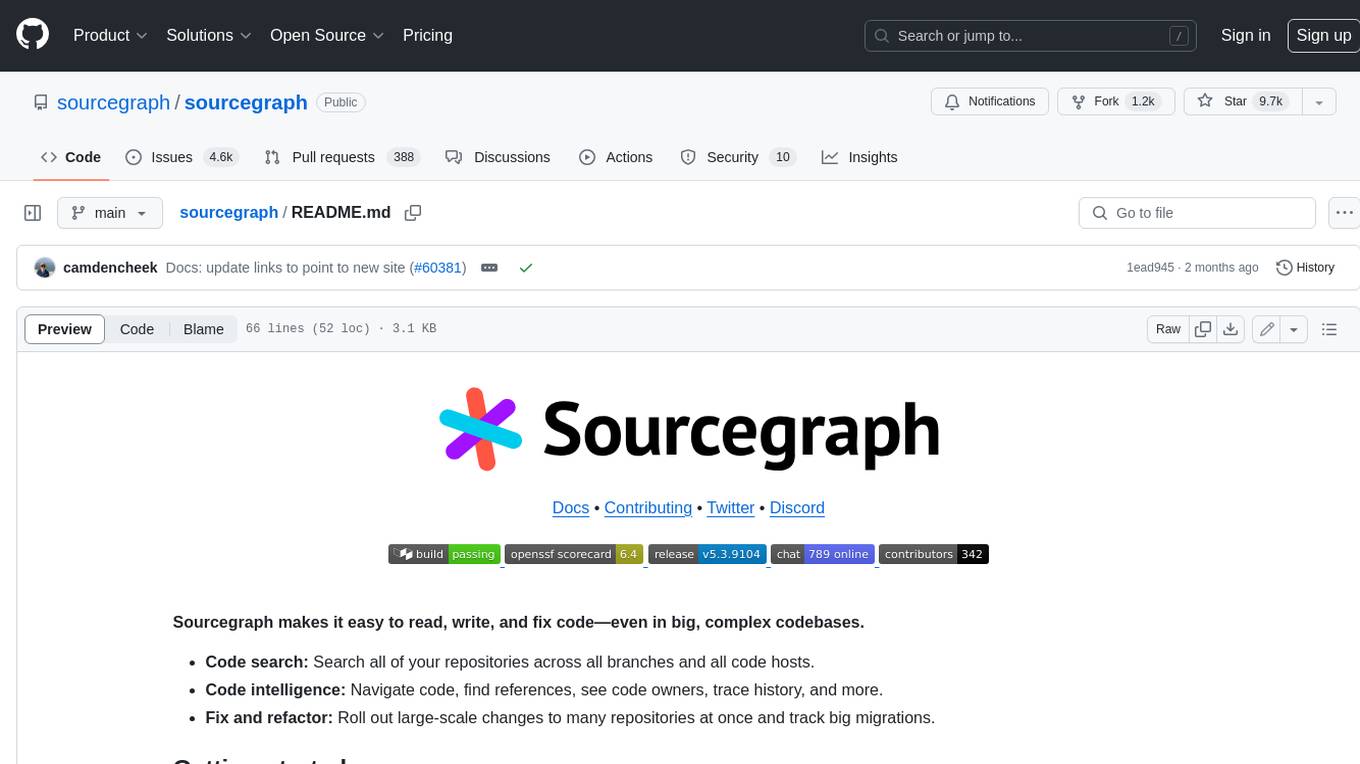
sourcegraph
Sourcegraph is a code search and navigation tool that helps developers read, write, and fix code in large, complex codebases. It provides features such as code search across all repositories and branches, code intelligence for navigation and refactoring, and the ability to fix and refactor code across multiple repositories at once.

pr-agent
PR-Agent is a tool that helps to efficiently review and handle pull requests by providing AI feedbacks and suggestions. It supports various commands such as generating PR descriptions, providing code suggestions, answering questions about the PR, and updating the CHANGELOG.md file. PR-Agent can be used via CLI, GitHub Action, GitHub App, Docker, and supports multiple git providers and models. It emphasizes real-life practical usage, with each tool having a single GPT-4 call for quick and affordable responses. The PR Compression strategy enables effective handling of both short and long PRs, while the JSON prompting strategy allows for modular and customizable tools. PR-Agent Pro, the hosted version by CodiumAI, provides additional benefits such as full management, improved privacy, priority support, and extra features.
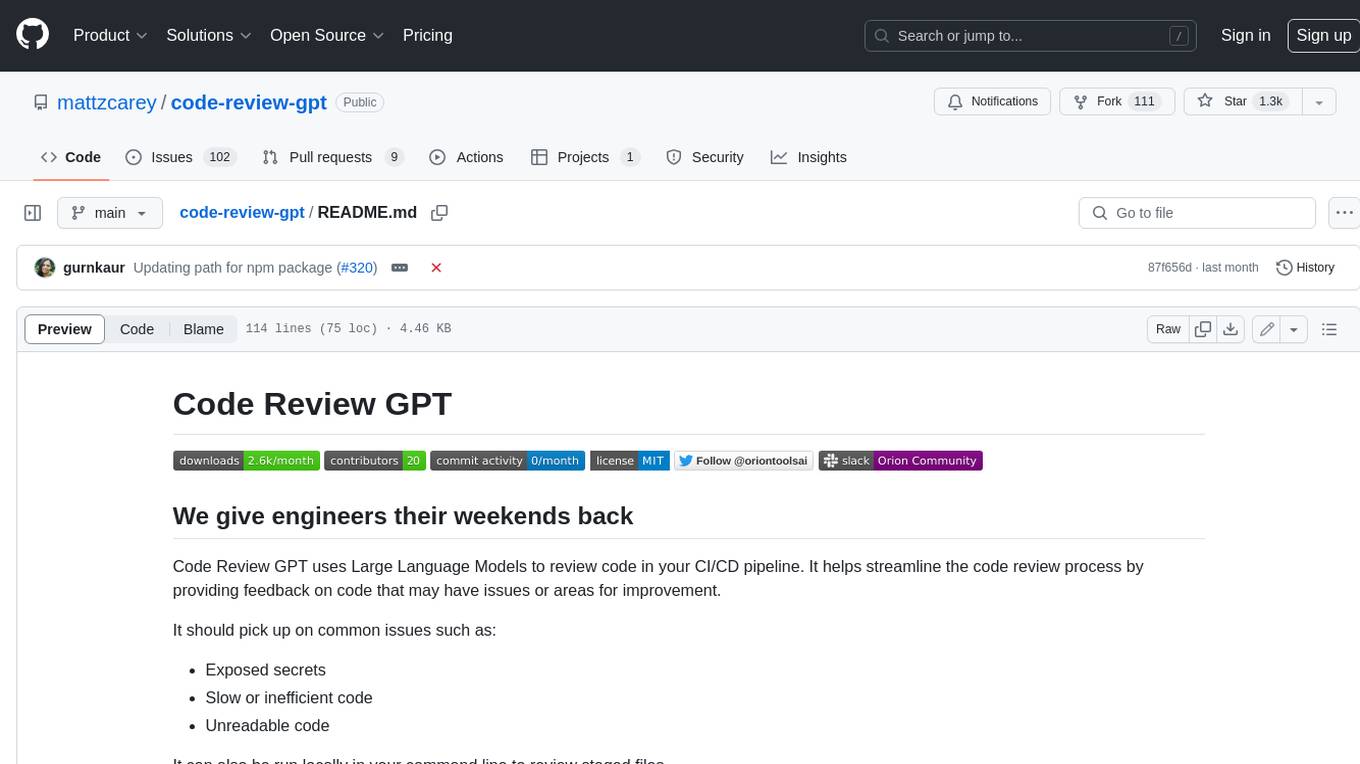
code-review-gpt
Code Review GPT uses Large Language Models to review code in your CI/CD pipeline. It helps streamline the code review process by providing feedback on code that may have issues or areas for improvement. It should pick up on common issues such as exposed secrets, slow or inefficient code, and unreadable code. It can also be run locally in your command line to review staged files. Code Review GPT is in alpha and should be used for fun only. It may provide useful feedback but please check any suggestions thoroughly.

DevoxxGenieIDEAPlugin
Devoxx Genie is a Java-based IntelliJ IDEA plugin that integrates with local and cloud-based LLM providers to aid in reviewing, testing, and explaining project code. It supports features like code highlighting, chat conversations, and adding files/code snippets to context. Users can modify REST endpoints and LLM parameters in settings, including support for cloud-based LLMs. The plugin requires IntelliJ version 2023.3.4 and JDK 17. Building and publishing the plugin is done using Gradle tasks. Users can select an LLM provider, choose code, and use commands like review, explain, or generate unit tests for code analysis.
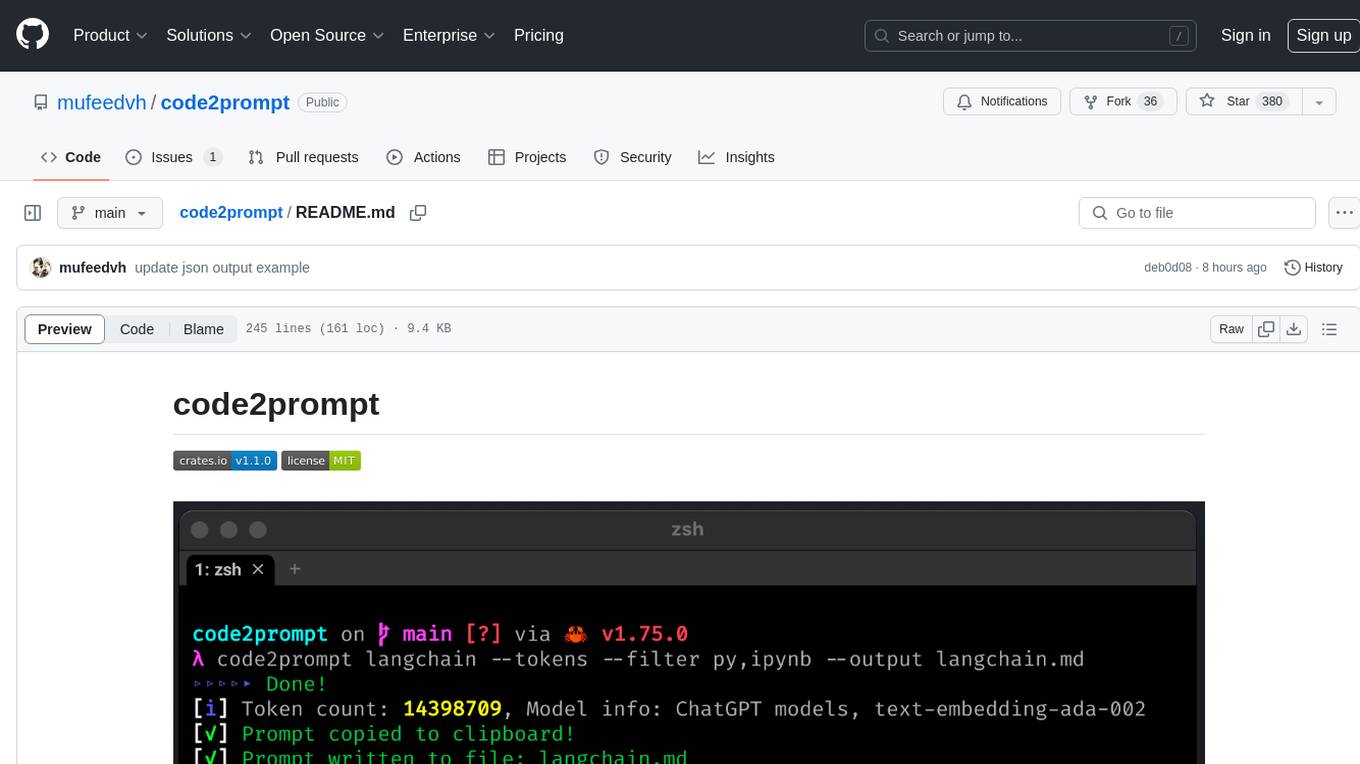
code2prompt
code2prompt is a command-line tool that converts your codebase into a single LLM prompt with a source tree, prompt templating, and token counting. It automates generating LLM prompts from codebases of any size, customizing prompt generation with Handlebars templates, respecting .gitignore, filtering and excluding files using glob patterns, displaying token count, including Git diff output, copying prompt to clipboard, saving prompt to an output file, excluding files and folders, adding line numbers to source code blocks, and more. It helps streamline the process of creating LLM prompts for code analysis, generation, and other tasks.
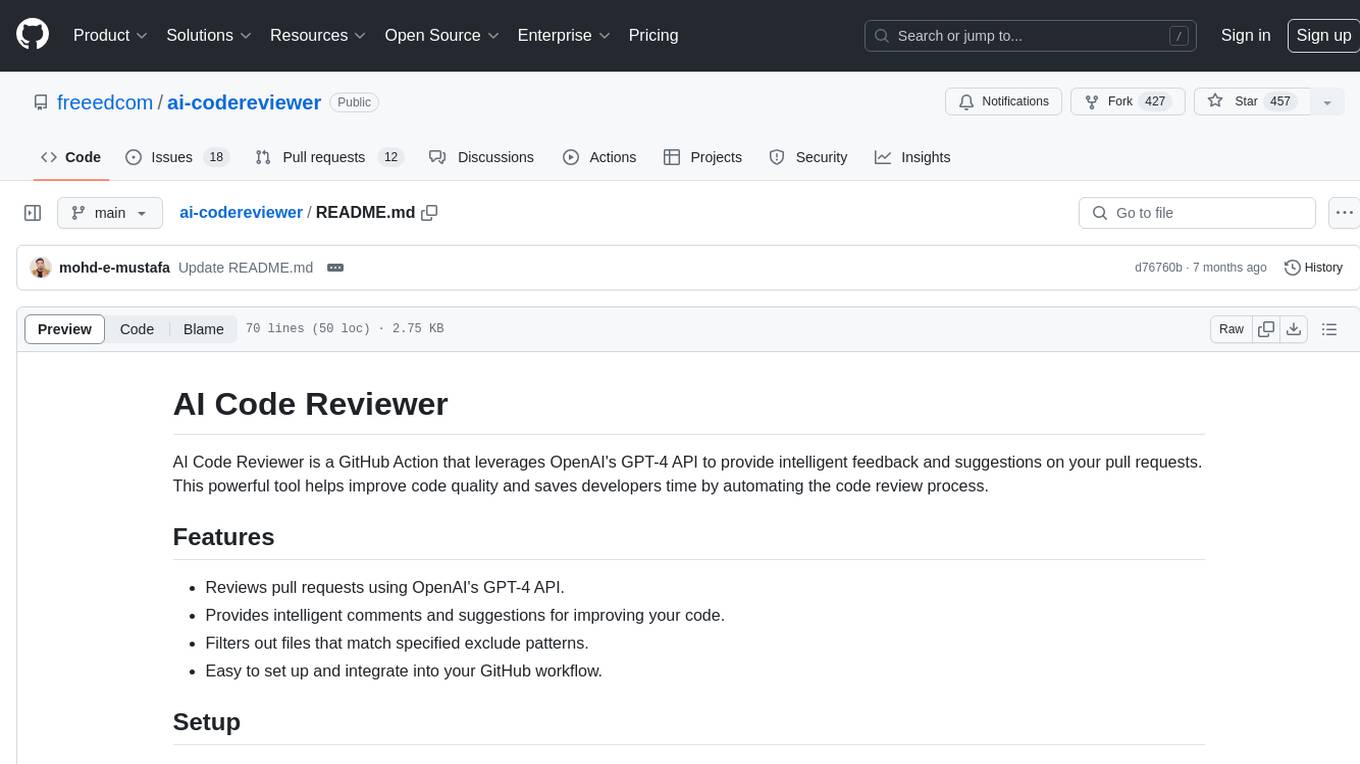
ai-codereviewer
AI Code Reviewer is a GitHub Action that utilizes OpenAI's GPT-4 API to provide intelligent feedback and suggestions on pull requests. It helps enhance code quality and streamline the code review process by offering insightful comments and filtering out specified files. The tool is easy to set up and integrate into GitHub workflows.
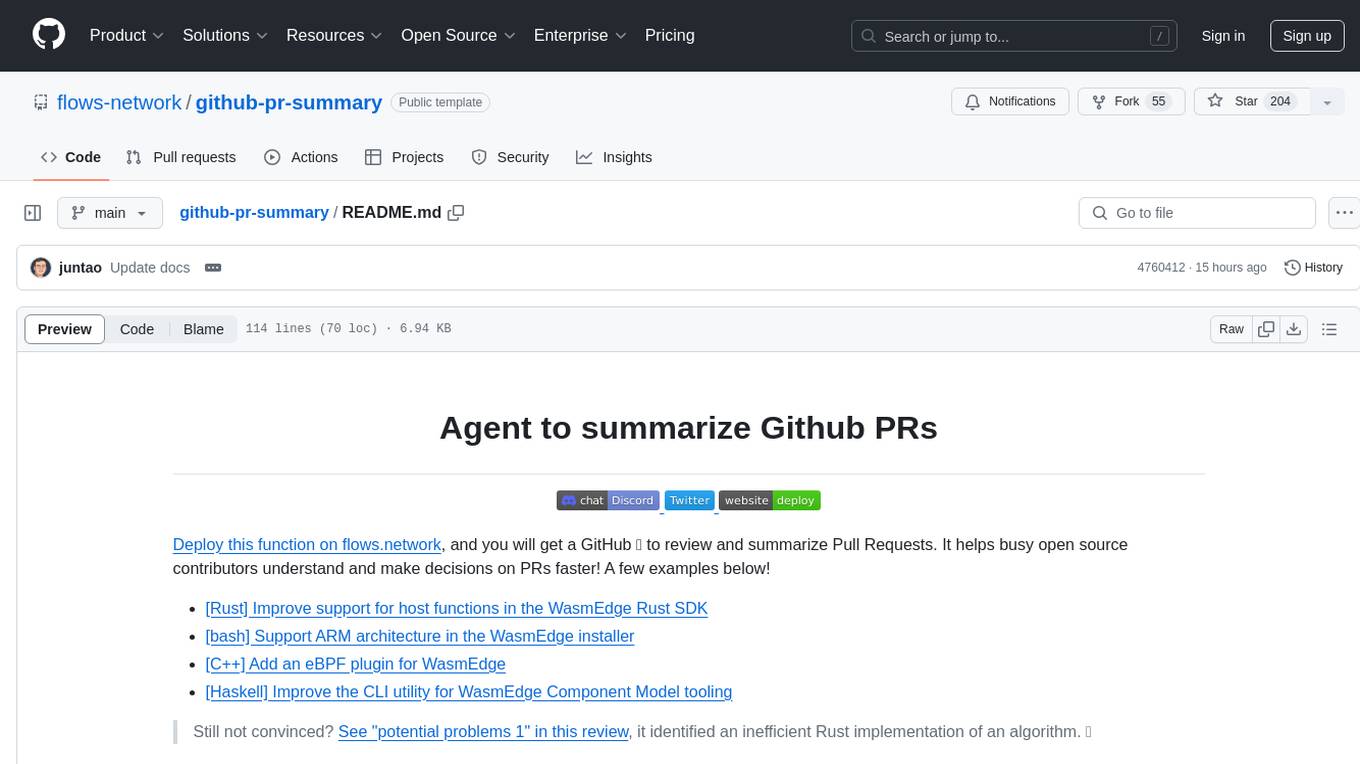
github-pr-summary
github-pr-summary is a bot designed to summarize GitHub Pull Requests, helping open source contributors make faster decisions. It automatically summarizes commits and changed files in PRs, triggered by new commits or a magic trigger phrase. Users can deploy their own code review bot in 3 steps: create a bot from their GitHub repo, configure it to review PRs, and connect to GitHub for access to the target repo. The bot runs on flows.network using Rust and WasmEdge Runtimes. It utilizes ChatGPT/4 to review and summarize PR content, posting the result back as a comment on the PR. The bot can be used on multiple repos by creating new flows and importing the source code repo, specifying the target repo using flow config. Users can also change the magic phrase to trigger a review from a PR comment.
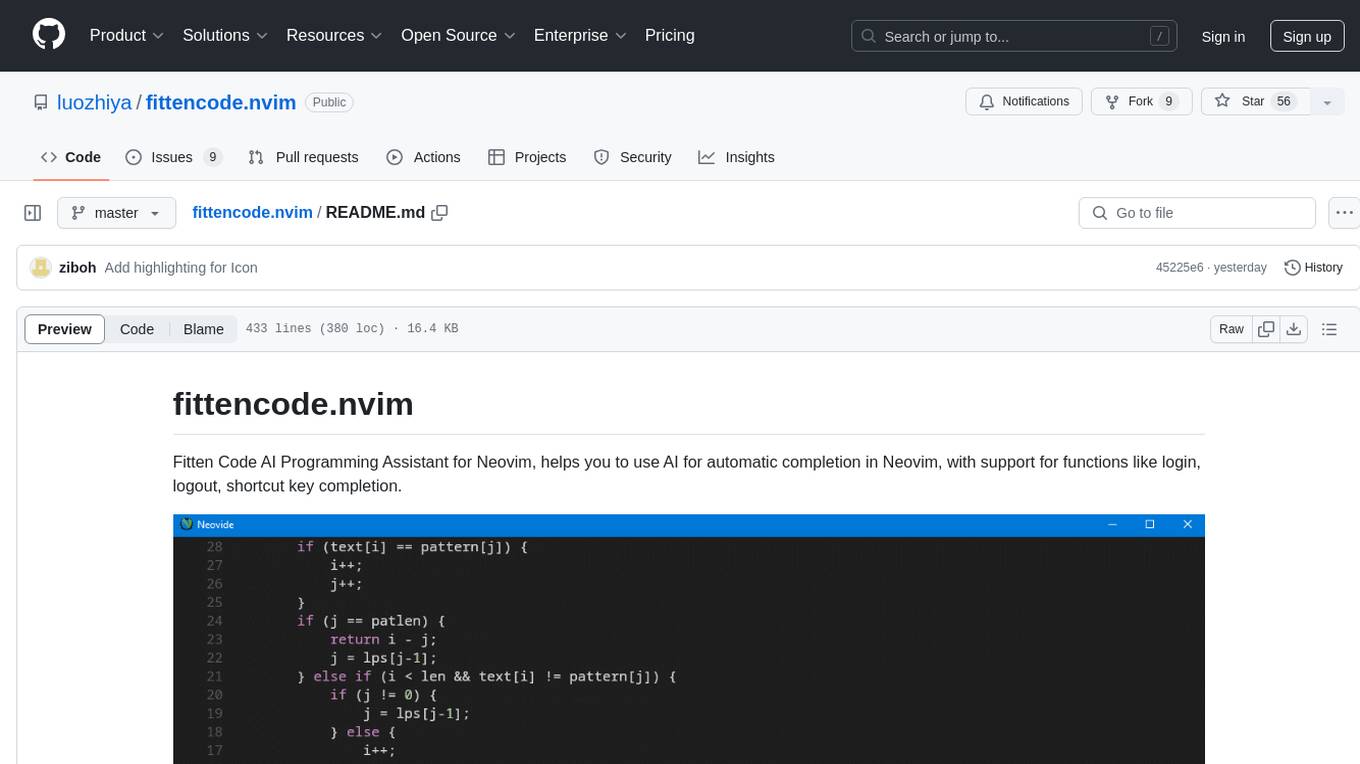
fittencode.nvim
Fitten Code AI Programming Assistant for Neovim provides fast completion using AI, asynchronous I/O, and support for various actions like document code, edit code, explain code, find bugs, generate unit test, implement features, optimize code, refactor code, start chat, and more. It offers features like accepting suggestions with Tab, accepting line with Ctrl + Down, accepting word with Ctrl + Right, undoing accepted text, automatic scrolling, and multiple HTTP/REST backends. It can run as a coc.nvim source or nvim-cmp source.




